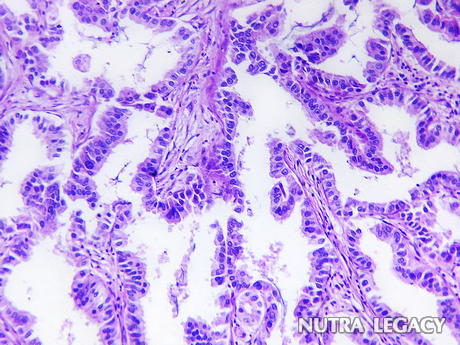What is Adenocarcinoma Cancer?

- Adenocarcinoma cancer is commonly seen in the lungs, but can affect any glandular tissue including internal organs
- One type of this cancer is adrenocortical carcinoma, which affects the adrenal cortex
- Lung cancer treatments can be very effective if adenocarcinoma cancer is situated in the lungs
What is adenocarcinoma cancer? This cancer is most commonly associated with cancer in your lung, but is actually a glandular tissue cancer that can affect cells in any tissue of this type. This includes cancer of the stomach, breast, cervix, lung, prostate, pancreas, and colon, as well as any other internal organs. There is another form of adenocarcinoma cancer which makes up approximately twelve percent of this type of cancer, and it is called mucinous adenocarcinoma. This form includes at least sixty percent mucous cells, and is very aggressive.
Adrenocortical carcinoma is another glandular tissue cancer. In this disease, the adrenal gland located at the top of yoiur kidneys has cancerous changes in the cells of the outer layer. This cancer is rare, but can be very dangerous. The adrenal glands have two layers, the cortex which is the outer layer and the inner layer which is called the medulla. The cortex is responsible for creating and regulating several critical hormones. These include hormones which will keep the salt and water balance in your body correct, that keep your blood pressure at the right level, and that manage your metabolism and sex characteristics. Tumors in the adrenal cortex can be classified as functioning or non-functioning. Functioning means that the tumor is causing excessive hormones to be created and released, and this will result in a wide range of symptoms, depending on the location of the tumor and the specific hormone being overproduced. Adrenocortical carcinoma may not cause any symptoms at all in the first stages if the tumor is non-functioning.
Adenocarcinoma cancer is responsible for around forty percent of all lung cancer cases diagnosed every year. Bronchioalveolar adenocarcinoma is when the cancer is present in the air sacs of the lung. Lung cancer treatments can be very effective when the disease is properly diagnosed early on, but the survival rate lowers the longer the time period is from the start of the cancer and the start of the treatments. These treatments can include surgery, chemotherapy, radiation treatments, immunotherapy, and many alternative treatment methods to compliment medical treatment. Your doctor will help you make the best choices when considering your lung cancer treatment options, and it is important to discuss alternative treatments and therapies with them to maximize the treatment benefits and your survival rate.
Symptoms of adenocarcinoma cancer can vary significantly, depending on the glandular tissue and internal organs that are affected. Some common symptoms that may occur regardless of where the cancer or tumor is located include any unexplained or unexpected bleeding from any orifice or area on your body, pain or discomfort that gradually worsens over time or starts out severe, a lump anywhere there should not be one, fatigue, and an unexplained weight loss when you are not dieting. If you notice any unusual signs or symptoms, discuss them with your doctor as soon as possible. Too many people brush off warning signs of cancer and delay assessment by their physician because they do not believe it is anything to worry about. Because these cancers affect internal organs, visible signs may not be apparent at first.
Early detection and treatment will greatly increase your odds of beating these cancers and surviving more than five years. Smoking, tobacco use, chemical exposures, and other cancer risks should be avoided, because these activities and substances will increase the odds of you developing some type of cancer in your lifetime. The risks and survival rate for any cancer will depend on many different factors, including the size and stage of the cancer, the type of cancer, the tissues affected, the treatments used, and others. If you have been diagnosed with cancer a cancer specialist called an oncologist can give you up to date information and treatment options so you can make the best possible treatment decisions.
The information supplied in this article is not to be considered as medical advice and is for educational purposes only.
|
| ||||||||||||||





 3 Feb 2009
3 Feb 2009